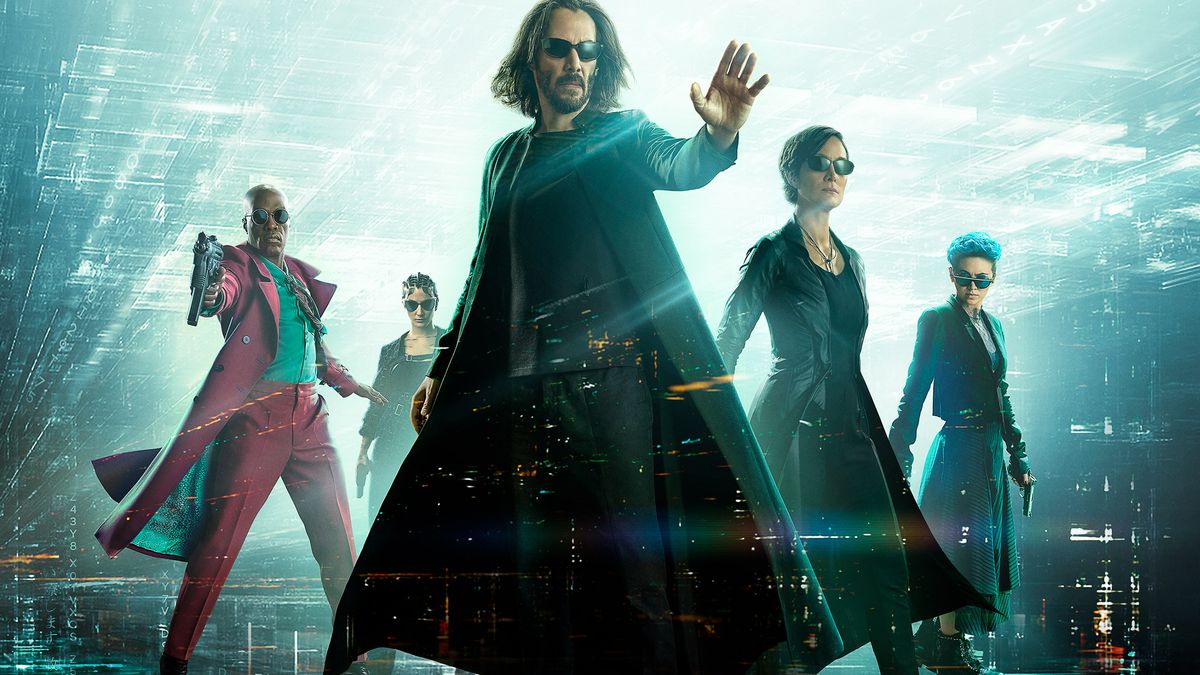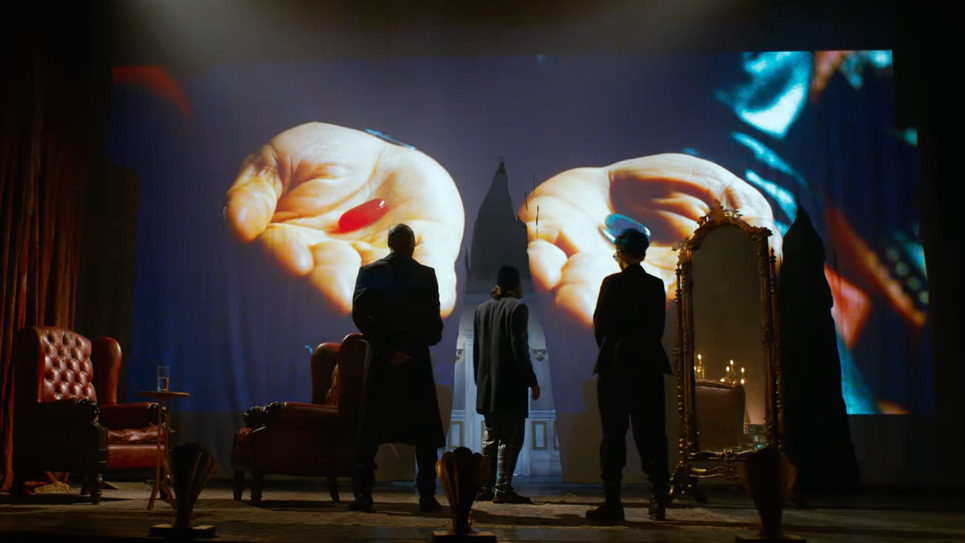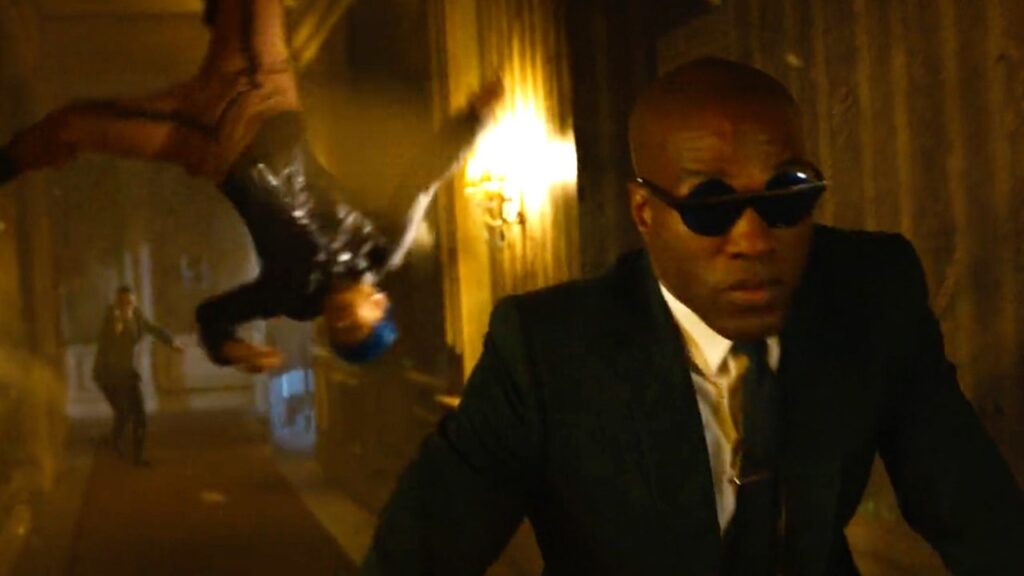
The path between me seeing The Matrix on opening night back in 1999, and me doing what I’m currently doing for a living — to this day — is a straight line. When The Matrix Reloaded, and The Matrix Revolutions, came out in the spring and winter of 2003, respectively, my friends and I skipped school, and went to the earliest showings we could find. When the 10-or-so disc DVD boxed set came out in 2004, you best believe I received it for Christmas (and still have it in my possession, surprisingly).
The Matrix is a big deal to me, is the point, so much so that I pinpoint that film as the first time I realized that movies could be about something more than what was merely onscreen; when my friends and I set about remaking The Matrix, for fun, as a comedic parody, off-and-on throughout high school, I had set about rewriting the entire script, thus making me be a better, more concise writer. So when word came about that a fourth movie, The Matrix Resurrections, was about to come out?
You best believe I got that goosepimply feeling the first time I saw the trailer…
Does a Matrix movie released more than 20 years after the original — and nearly 20 years after its last, much derided sequel — hold up? Does it have anything new to add to series? It does. Greatly so. I’m going to go right ahead and say something that will allow you to quickly determine whether this movie is for you: this movie is on par with The Last Jedi in how it subverts its own mythology, and adds a refreshing metatextual commentary on its own existence. This film — like The Last Jedi — is a decades-late sequel that actually does the work in expanding upon, and beyond, what worked with the original, while not fully ignoring everything in between.
If you hated The Last Jedi, you can stop reading right now.
Director Lana Wachowski — pressured into revisiting her groundbreaking cyberpunk opus due to Warner Brothers basically forcing her to do so, or hand off the reins to a third party — has set Resurrections some 60 years after the events of Revolutions. The film begins as an almost shot-for-shot remake of the opening scene of the first film: every beat, line, camera move, lighting choice, is deliberately mimicked…yet everything is just slightly off. Trinity looks different, her clothing looser. And while lines are exactly the same, they’re not said by the people who should have said them. And then the Agents appear…and things are definitely off.
The opening scene, we soon learn, is a modal built inside a MMPORPG — essentially a hidden cutscene playing on loop forever. Hacking into the modal is Bugs (Jessica Henwick), who is on the search for Morpheus (Yahya Abdul-Mateen II) who, we also learn, has been trapped living a loop as well. The designer of the modal — and the larger MMPORPG in which it is hidden — is none other than Thomas Anderson, nee Neo (Keanu Reeves), who has spent what he believes has been the past 20-odd years living off the success of his groundbreaking game, The Matrix.
Forced into a position where Warner Brothers (who, in the movie, owns the rights to The Matrix game) is going to revisit The Matrix as a sequel, with or without his help or input, Thomas is forced to reconcile his own connection to the Matrix, a connection which is so strong he is driven to hallucinations and, at one point, almost committed suicide. His analyst (Neil Patrick Harris) has helped Thomas reclaim control over his life using meditative techniques, and helping to separate the fantasy from the fiction. That is…until Morpheus pops into the “real” world.
I’m already this far into the review, just got to the end of the inciting incident. Look, I could write an entire essay on this movie (and probably will…): it is a much more mature film than I was expecting, and perhaps a much more mature look at the entire franchise than audiences were expecting, but it truly is a superior movie than either of the sequels. While the explanation behind how exactly Neo is alive took some time to fully appreciate, the thematics of why he is works.
The crux: if the sequels doubled down on its own mythology to the point of expositing much more than it should have (which both slowed down the action and made the central themes confusing or otherwise opaque to general audiences), this film uses its own nostalgia to ease audiences into feeling what these movies are about, as opposed to characters talking about it.
The result? A more intimate, lower-stakes, scaled-back story set in the universe of The Matrix; a movie that is essentially a prolonged love story that hinges on a will-she-won’t-she decision by one of the main characters predicated on the idea that maybe a happy fantasy is preferred when reality is dangerous and confusing and painful (especially when that fantasy is something that can never be achieved in the “real” world to begin with). If The Matrix was about Neo making a choice, Resurrections is about him trusting in another person’s decision, no matter what the outcome. And, yes, The Matrix is about a lot of Things.
There is an entire genuinely funny sequence in Resurrections where game designers talk in a circle about what made The Matrix “work”…often repeating the same things over and over until their words lose all meaning; hell, even Morpheus in one sequence mockingly repeats his own technobabble from the first film, chiding Neo by saying sometimes hearing something familiar helps ease people into new ideas, even if that familiar something doesn’t make much sense to begin with. But sometimes the choices made are only half-answers, or in need of being abandoned — as is the case in the fate of Zion and Morpheus — and change needs to occur.
Lana Wachowski shook up the foundation of her own masterpiece, not rehashing the same story or mythology, or even the same old conflicts, but using it to push into something richer and more sublime. The action does rock — even if most of it occurs in the opening and closing scenes, respectively. And while Henwick was a great new addition, Abdul-Mateen II just does not yet have the gravitas of his predecessor (although, yes, that is part of the point of his recasting).
There is nothing as groundbreaking as bullet-time (as if there could be at this point…although this movie does play with the concept in interesting and fun ways), but there is something so satisfying about Jonathan Groff‘s face breaking against the ground in his turn as Smith (again…he suffers from not enough gravitas…but that is also the point). Wachowski proves herself to be a solid director and writer on her own, and both Neo and Trinity (a still-impossibly-cool Carrie-Anne Moss) not only talk and feel like real human beings (the change in Neo’s character is the most drastic, yet most rewarding), but have honest-to-God chemistry that proves itself to be the actual climax to the movie.
Truth be told, Reloaded and Revolutions are strictly sci-fi/action movies with overly-explained philosophical ideas attached, and eventually collapse under their own weight. Resurrections might be smaller scale, and more intimate, but its ideas are much richer, broader, and interesting than anything since the first Matrix. Oh, and keep and eye out for both Matrix veteran actors Daniel Bernhardt and Lambert Wilson! …What a bunch of jerks. 4.5/5 Speeding Bullet Whiskeys.
The Matrix Resurrections is playing in theaters, and available to stream with premium account on HBO Max.







